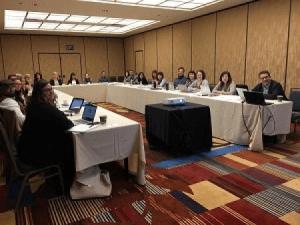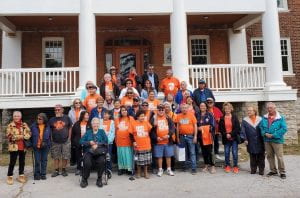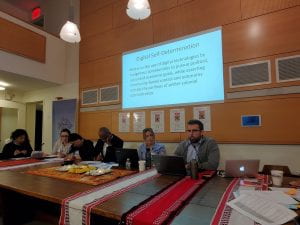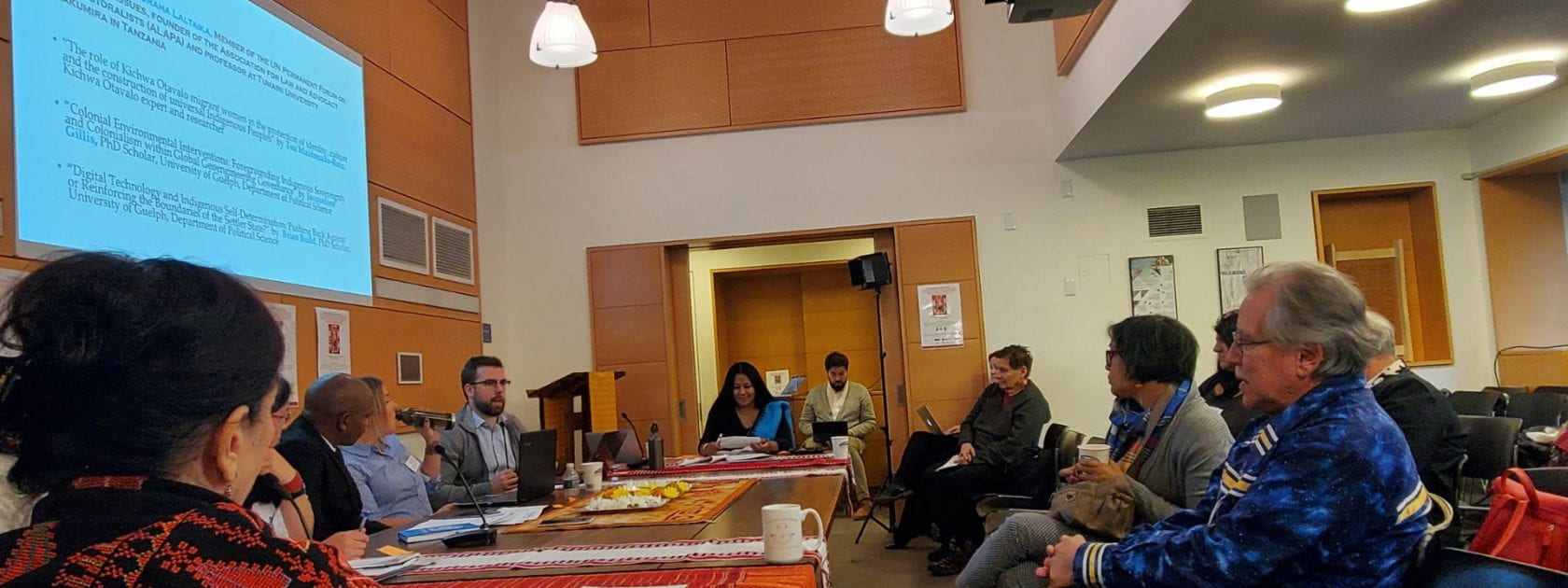SSHRC Projects
I am/have been the Principal Investigator on SSHRC Grants with a total monetary value of $1.117 million CAD, and I am a participant in SSHRC grants with a monetary value of 1.78 million CAD.
Current SSHRC Project
“Maximizing Indigenous Self-Determination: Theory and Practice of Indigenous Sovereignties in Settler States and the International System” (2023-2028)
Role: Principal Investigator
This project (with me as Principal Investigator and Sheryl Lightfoot as Co-Investigator) expands on our IG “Complex Sovereignties” (complete in March, 2024). We seek to document, measure, and compare how Indigenous political actors in Canada and other countries are advancing self-determination in practice, with, within, and across the borders of individual states, while navigating the international system, in assertive, maximal, innovative, and peaceful ways. Indigenous practices of self-determination bring new conceptions of territory, citizenship and international legal personality to the fore, and relies on a foundation of Indigenous identity, philosophies, legal and political orders.
This research program recognizes the challenges faced by IPs when seeking to articulate their interests within a settler colonial context. We explore distinct, but overlapping and complementary, forms of self-determining practice, including passports, independent trade or diplomatic missions, involvement in elements of state external sovereignty, treaty relations, territorial and economic self-determination, pooled sovereignty, global organizing beyond the state, and the rebuilding and assertion of nationhood.
We use recognized Indigenous methodologies, and proceed from a strong basis of community stakeholder support. This includes working closely with a team of Indigenous and other collaborators in Canada, Aotearoa New Zealand, Australia, Nordic countries, and elsewhere. A clear, comparative, and systematized discussion of Indigenous self-determination goals and practices globally may help policy makers to better conceptualize how to support self-determination efforts as a means of affirming mutually respectful, nation-to-nation relationships, as articulated in UNDRIP.
Previous SSHRC Projects
SSHRC Connections Development Grant (2022)
Role: Co-Investigator
Status: Ongoing. “Settler Colonialism in Canada: Perspectives, Comparisons, Cases.”
Description: SSHRC Connections Grant 2022 (with Emily Grafton Lead and Jérôme Melançon) workshop on settlers “Settler Colonialism in Canada: Perspectives, Comparisons, Cases.” This has three dimensions.
- Four virtual public lectures by Indigenous leaders June 7-14 in a lead up to National Indigenous Peoples Day.
- In person and virtual conference “Settler Colonialism in Canada: Perspectives, Comparisons, Cases” at University of Regina and mâmawêyatitân centre, 23-25 September. Indigenous Elders and Knowledge Holders are crucial in planning, will deliver keynotes and participate in sessions. Ceremony will be part of the conference. Two half-day virtual workshops on 1 and 7 October (co-organized by me, Emily, and Jérôme).
- Graduate Student Symposium and Open Access Publication: “Canadian Settler Colonialism: Reliving the Past, Opening New Paths” held virtually through the University of Regina and co-organized by me, Emily, and Jérôme. The conference will take place in mid-October with dates to be confirmed.
SSHRCC Partnership Development Grant (2021-2024)
Role: Co-applicant “Decolonizing Settler States: Unravelling Systemic Blockages to Indigenous Rights in State Institutions and Civil Society” (2021-24)
Description: This SSHRC Partnership Development Grant (PI Sheryl Lightfoot) builds on and deepens the International Indigenous Rights Research Network of which I am a part. I am a co-applicant, along with an international team of Indigenous and non-Indigenous academics and practitioners from Canada, the United States, Finland, Aotearoa New Zealand, and Australia. The group also includes representatives from the Expert Mechanism on the Rights of Indigenous Peoples. My role is:
- Working alongside graduate students to develop scoping studies on the ways the UNDRIP has been implemented in the Canadian and New Zealand contexts. Research on how subnational units, including provinces and municipalities, have chosen to implement Indigenous rights.
- Focus on “Reporting mechanisms,” for monitoring state, provincial, and municipal implementation of Indigenous rights, including a monitoring app.
- The University of Guelph has provided support to the partnership in the amount of $82,000 over the duration of the project. I have two grad students working for the PDG.
SSHRC Insight Grant (2017-2023)
Role: Principal Investigator Complex Sovereignties: Theory and Practice of Indigenous-Self Determination in Settler States and the International System”
Description: This project (with me as Principal Investigator and Sheryl Lightfoot as Co-Applicant) seeks to conceptualize Indigenous Peoples’ rights to self-determination in new, creative and innovative ways, which fully respect Indigenous laws, traditions, and nation-to-nation relationships with settler governments. Scholarly debates in the Indigenous rights, politics, and law literatures focus attention on whether the UN Declaration on the Rights of Indigenous Peoples advances Indigenous rights, or constitutes a form of assimilation and subjugation. This project sheds light on how Indigenous political actors in Canada, Aotearoa New Zealand, USA, and Nordic countries, are advancing self-determination in practice with, within, and across the borders of states, while navigating the international system, in assertive, maximal, innovative, and peaceful ways. Our research aims to inform both the theoretical development of self-determination and policy decisions, building on literature documenting the history of Indigenous diplomacy and trade. We will also problematize methods by which states are resisting or acceding to these efforts, given the history of settler state suppression of Indigenous rights. We plan to explore distinct, but overlapping and complementary, forms of self-determining practice, including passports, independent trade or diplomatic missions, involvement in elements of state external sovereignty, treaty relations, territorial and economic self-determination, pooled sovereignty, global organizing beyond the state, and the rebuilding and assertion of nationhood.
SSHRCC Partnership Development Grant (2018-2021)
Role: Co-Applicant “Transformative Memory: Strengthening an International Network”
The Transformative Memory Partnership seeks to create an international network of scholars, artists and community -based memory workers to co-create and exchange knowledge and practice on the way s memory is employ ed to address the responsibility people have towards the well-being and rights of others in the aftermaths of mass violence. Official, often state-created or endorsed memory projects include trials, truth commissions, national inquiries, and museums, commissioned works of art or monuments. Such projects exist alongside unofficial, often victim-led and community-based memory projects, such as the creation of public shrines or tributes to the dead, marches, protests, and creative works, such as memory quilts, art installations and performances. Not all memory-building processes are transformative or oriented towards more inclusive, pluralistic ways to be together. Stakeholders, for example, can and have used memory to instill nationalistic projects based on the exclusion or dispossession of others. Taking into account these different uses and outcomes of other types of memory projects, the partnership aims to examine what makes the work of memory transformative. The partnership will ask the following core questions: How and why do people forget, deny or remember responsibility for mass violence? Who defines this and who is silenced? What are the actions that foster transformative way s of remembering and relating to one another? What are the practices and actions that on the contrary inspire pro status quo memory building process? How do we listen to loss and foster an ethics of responsibility? What futures are imagined?
SSHRCC Partnership Development Grant (2014-2019)
Role: Co-Applicant “Embodying Empathy : Fostering Historical Knowledge and Caring Through a Virtual Indian Residential School”
DESCRIPTION Canadians must become better informed about the history and legacies of Indian Residential Schools and the damage they inflicted and in many ways continue to inflict on Aboriginal peoples in Canada. This awareness will contribute to the larger process of “unsettling” settler Canadians, of morally and politically reorienting them towards the structural violence encountered by Aboriginal s not just historically but, even now, in Canada’s prison systems, foster homes, and education system. But how should the tragic story of the IRS, the nation’s “dark secret, ” be made known to the Canadian public? What form must it take, what content conveyed, in order to create more understanding, compassion, and respect for Aboriginal people and their goals? Can emerging technologies help represent the IRS experience in a way that successfully “reframes” understanding of settler – colonial history, and thereby ideas of a common future? The overarching goal of Embodying Empathy is to promote knowledge of Canada’s Indian residential schools. We intend to stimulate debate and discussion about the ongoing legacies of these institutions in support of, and as an innovative supplement to, the work done by our partners the National Research Center on Residential Schools (NRCRS), Shingwauk Residential School Centre (SRSC) and the Legacy of Hope Foundation (LHF). Our springboard will be the prototype of a virtual residential school constructed using leading – edge technologies in a partnership that brings together Elders, Survivors, Aboriginal commemorative and educational agencies, curators, scholars, artists, and technology experts. In our design methodology, Elders will play a central role in situating and grounding this research, and as “key informants” they will contribute to our “participatory design” process.
Some of Our Meetings
Part of our Insight Grants involves enhancing and expanding research networks. This has involved conferences and workshops to bring Indigenous activists, academics, and practitioners together with non-Indigenous academics and students.
International Studies Association conference 2024 (8 Panels and workshop co/organized)
Organized / co-organized eight panels for the 2024 International Studies Association Conference in San Francisco, including organizing four panels for the “Structuring Inclusion” series as part of my duties as member of the Committee for Diversity and Representation. Co-organized a full day workshop entitled “Indigenizing the Study of International Relations: Indigenous Peoples and Justice in World Politics” (held 2 April; with co-organizers Sarah Maddison, Sheryl Lightfoot, and Rauna Kuokkanen).
International Studies Association conference 2023 (Panels organized)
International Studies Association conference 2022 (Panels organized)
International Studies Association conference 2021 (Panels organized)
International Studies Association conference 2020 (5 Panels organized)
I organized three Indigenous panels with Sheryl Lightfoot: “Indigenous Treaties, Custodianship, and Constitutional Recognition,” “Indigenous Peoples, Global Politics and the Environment,” “Indigenous Peoples, Representation, Governance, and International Law”. I also organized a panel on comparative genocide studies with a strong Indigenous focus: “New Directions in Genocide Studies: Multiple Perspectives and Identities,” and a panel on populism entitled “Global Populisms and Multiple Identities in International Relations.” I also organized a panel on critical race theory, with input from Ajay Parasram: “Structural White Supremacy and Global Colonial Modernity”.
International Studies Association conference (Panels and Workshop 2019)
I was the primary organizer of an International Studies Association funded workshop entitled “Re-envisioning International Studies through Indigenous Politics” (held 26 March, 2019 in Toronto). This was based on an application I submitted with my co-organizers Sheryl Lightfoot, Sarah Maddison, and Rauna Kuokkanen. The event was opened by Elder Garry Sault of the Mississaugas of the Credit First Nation. This was the first time an Elder has opened an event in the history of ISA. We had 16 participants including a number of graduate students. My PhD students Brian and Jackie helped me organize the event and also presented their own papers. My new PhD student Joanna Moores attended but did not present.
Native American and Indigenous Studies Association (Hamilton, NZ, 2019)
Paper presentation: “Pushing the Boundaries: Practicing Self-Determination at the United Nations and in Settler States” (co-author Sheryl Lightfoot) Accepted for presentation in Panel “The Politics of Practicing Self-Determination” at the 2019 Native American and Indigenous Studies Association (NAISA) conference (University of Waikato, New Zealand).
Conference with Columbia University (October, 2019, USA)
Co-Applicant with Sheryl Lightfoot for a successful SSHRC connections grant for an International Symposium on Indigenous Peoples and Borders: decolonization, contestation, transcendence New York, 11-12 November 2019. This is organized in conjunction with Elsa Stamatopoulou Director, Indigenous Peoples’ Rights Program, Institute for the Study of Human Rights at Columbia University, New York.
International Political Science Association (Melbourne, Australia, 2018)
Convener of “Practicing Self-Determination: Indigenous Peoples and the Politics of Settler States and the International System.” The panel was accepted and I presented a paper in the panel on 23 July 2018 entitled “Indigenous Peoples and Mixed Member Proportional Representation: Does it work for Maori in Aotearoa New Zealand and would it improve Indigenous representation in Canada?” I also served as discussant for the panel “Governing Australian Settler Colonialism: Conflict and Policy in Contemporary Indigenous Politics.”
International Studies Association conference (Panels and Workshop 2018)
I was the primary organizer of an International Studies Association affiliated working group entitled “Indigenous Peoples, Global Politics, and Complex Sovereignties” (held 3 April, 2018 in San Francisco). This was based on an application I submitted with my co-organizers Sheryl Lightfoot and Rauna Kuokkanen. The initial application was not funded by ISA but they did provide us with a free conference room and administrative assistance (we had to pay for the catering costs). I also delivered a paper on settler identities and international politics. Indigenous scholars Lightfoot and Kuokkanen helped coordinate the working group when it was held. We had 23 participants including a large number of graduate students. My PhD students Brian and Jackie helped me organize the event and also presented their own papers.



SSHRCC Insight Grant (2013-2018)
Role: Principal Investigator “Aboriginal-Settler Bi-Nationalism as a form of Reconciliation within a Multicultural context: Can a New Zealand model of Power“
Status: Completed
DESCRIPTION Hidden in plain sight, Aboriginal peoples are one of the fastest growing groups in Canada, yet their contributions have been marginalized politically and culturally in national life. It is undeniable that Aboriginal peoples face serious power imbalances relative to settler Canadians, due to the intergenerational effects of legalized discrimination, alienation from ancestral lands, abuse in Indian Residential Schools (IRS), inordinate rates of incarceration, poverty, social exclusion, and other systemic challenges. Those conducting research with Aboriginal peoples are well aware of broken relationships and fractured communities created by the IRS system, but are equally cognizant of the potential of Aboriginal traditional systems and ways of knowing to engender a more vibrant and dynamic society for all of us. There is movement towards improving Aboriginal-settler relationships through reconciliation, a term with multiple interpretations. The Truth and Reconciliation Commission of Canada (TRC) observes that reconciliation may take seven generations, but has chosen to focus on shorter term reconciliation between Survivors, Aboriginal families and communities, with an emphasis on their healing journeys. Complementing the TRC, a longer term vision of reconciliation, epitomized through seven generations teaching, could potentially channel Aboriginal and non-Aboriginal energies towards a better, shared future. One (albeit imperfect) model of where we might direct reconciliation efforts is offered by New Zealand. From the 1970s, (indigenous) Māori political mobilization and Pākeha (settler) acknowledgement of colonial injustices inaugurated bi-nationalism, a process of power sharing and cultural syncretism between settlers and indigenous peoples, something starkly different from our view of bi-nationalism as an English-French settler dyadic relationship. This program of research problematizes NZ style bi-nationalism as a model of reconciliation in Canada, within a multicultural context. This project tests whether the NZ model can be expanded to encompass bi-national multiculturalisms – that is, to create a framework which recognizes both the diversity and distinctiveness of Aboriginal peoples as pre-conquest multicultural peoples, alongside the multiculturalism of settlers. To gauge how Canada’s racialised minorities (in particular South Asian and Caribbean peoples) relate to each other now through multiculturalism, and to posit how this relationship might change in positive ways (while also identifying potential problems) if reconciliation is successful in creating a bi-national basis for governance in Canada.
SSHRCC Standard Research Grant (2009-2013)
Role: Principal Investigator “Indigenous People and the UN Genocide Convention: A Study of Indigenous Assimilation Policies in Canada”
Status: Completed
DESCRIPTION In the 19th and 20th centuries, indigenous residential schooling in Canada formed part of a government-sponsored policy of forced assimilation. This program of research investigates to what extent the 1948 UN Genocide Convention (hereafter the UNGC) is applicable to the study of First Nations residential schooling in Canada. This project has three principle aims: To outline the extent to which the UNGC has been incorporated into domestic laws in Canada, and to identify tensions between domestic legislation and international law. To understand the process by which people might advance claims of indigenous genocide, and to comment on how different judicial approaches to statutory interpretation and incorporation of the Convention influence the success of failure of these claims. To critically examine arguments for and against the proposition that aspects of government and church sponsored indigenous assimilation policies in Canada might be seen as “genocidal” according to the UNGC.



